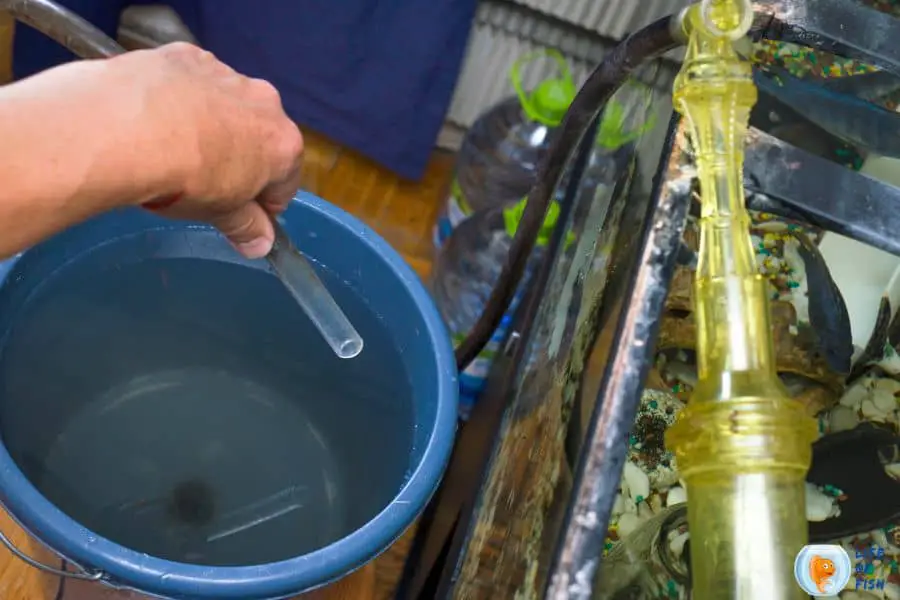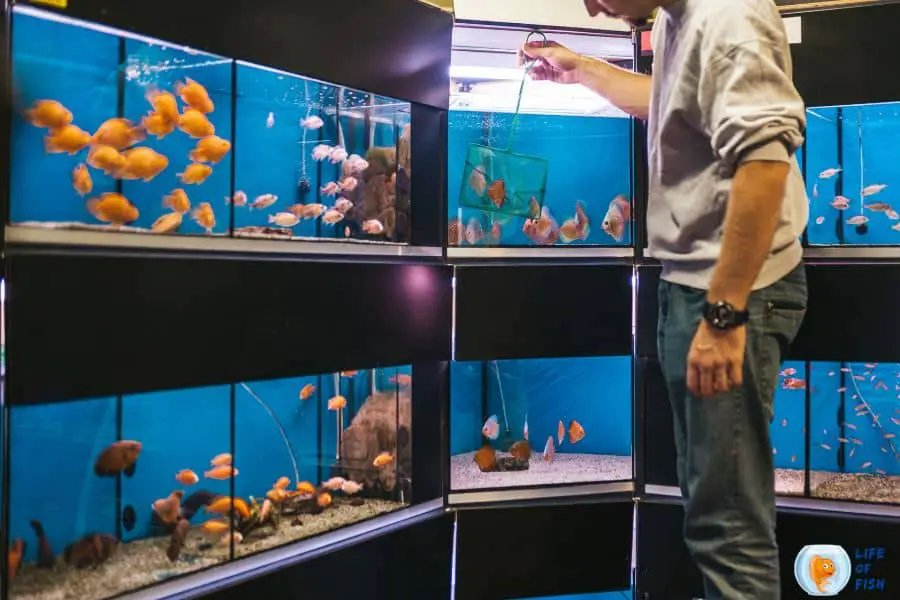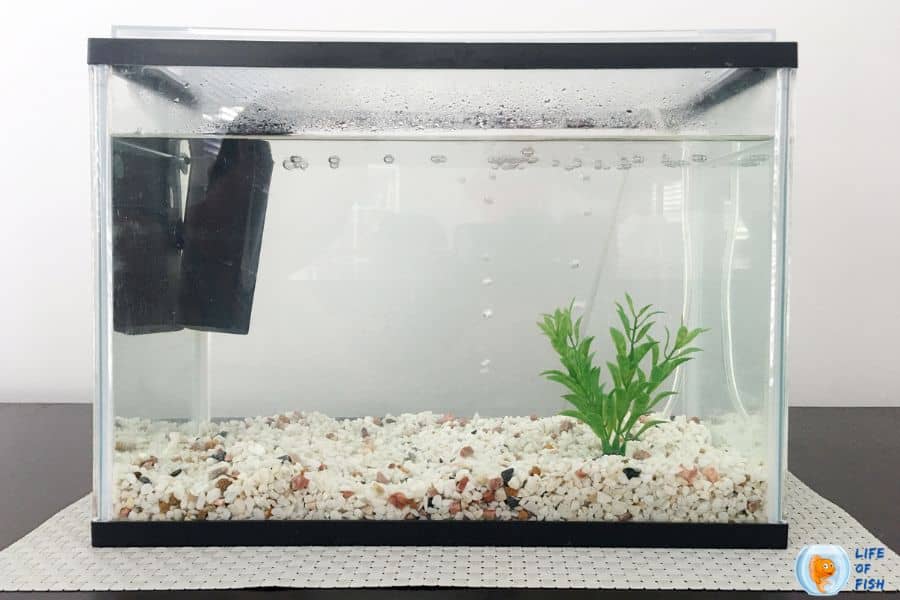Disposing of aquarium water is one part of regular aquarium maintenance. While it might seem like a simple task, there are some essential things to keep in mind to ensure that you’re doing it safely and effectively. In this article, we’ll go over some tips on how to dispose of aquarium water properly.

Why Dispose of Aquarium Water?
Jump To
- 1 Why Dispose of Aquarium Water?
- 2 How to Dispose of Aquarium Water
- 3 Where to Dispose Of Aquarium Water?
- 4 Can I Water My Garden With Fish Tank Water?
- 5 What Are The Benefits of Aquarium Water for the Plants?
- 6 How Often Should I Water My Plants With Aquarium Water?
- 7 How To Dispose Of Saltwater From An Aquarium?
- 8 How to Dispose of Aquarium Water with Chemicals?
- 9 How To Dispose Of Aquarium Chemicals?
- 10 How long do aquarium chemicals last?
- 11 Is it ok to dispose of expired aquarium chemicals through the drain?
- 12 Can you reuse aquarium water?
- 13 Final Words
You may need to dispose of aquarium water for a variety of reasons. The most common reason is simply to do a partial water change.
Over time, aquarium water can become polluted with waste and chemicals, so it’s important to change the water regularly to keep the water clean and healthy for your fish.
Another reason you might need to dispose of aquarium water is if you’re moving your fish to a new tank. In this case, you’ll need to transport some of the old water with the fish to help them acclimate to their new environment.
Finally, you might need to dispose of aquarium water if your fish are sick or have died. If you suspect your fish is sick, removing them from the main tank as quickly as possible is essential to avoid the spread of disease.
And, if your fish have died, it’s important to remove their bodies from the water to prevent the water from becoming polluted.
How to Dispose of Aquarium Water
Let’s speak about how to dispose of aquarium water now that we’ve discussed some of the reasons why you might need to.
Gather the supplies
The first thing you’ll need to do is gather some supplies. You’ll need a bucket, a siphon, and some rubber gloves. It’s also good to have a trash can or garbage bag nearby to collect any debris.
Siphon the water from the aquarium to the bucket
Next, you’ll need to siphon out some water from your aquarium. Start by putting the end of the siphon into the aquarium and placing the other end into the bucket.
Then, start the siphon by sucking on the aquarium’s end. Once the water starts flowing, it will continue to flow until you remove the end from the bucket.
Once you have enough water in the bucket, you can stop the siphon and remove it from the aquarium.
Where to Dispose Of Aquarium Water?
A common question we hear is, “where can I dispose of aquarium water?” The answer is that it depends on how much water you’re disposing of.
If you only do a partial water change, you can simply pour the water down the drain. However, if you’re disposing of a large amount of water, you’ll have to follow some other steps.
In this case, you have two options.
- Pour the water through the drain
- Water your plants and the garden with the water

Can You Pour Aquarium Water Down The Drain?
Yes. It is ok to pour aquarium water down the drain, but there are a few things you need to keep in mind.
Pour small amounts of water at once
You should only pour small amounts of water down the drain at a time. Pouring too much water at once can overwhelm your septic system or sewage treatment plant.
Do not pour water with chemicals.
You should never pour aquarium water down the drain if it contains chemicals. Chemicals can pollute the environment and harm plant and animal life.
Do not pour water with fish.
You should never pour aquarium water down the drain if it contains fish. Fish can escape into the wild and spread disease.
Do not pour water with dead fish.
You should never pour aquarium water down the drain if it contains dead fish. Dead fish can pollute the water and spread disease.
So, if you’re disposing of a small amount of water that doesn’t contain any chemicals or fish, you can pour it down the drain. However, if you’re disposing of a large amount of water, you should follow one of the other methods we’ve mentioned.
Can I Water My Garden With Fish Tank Water?
Yes. This is, in fact, the preferable method, as it doesn’t require any special equipment or chemicals.
To do this, simply pour the water onto your plants and garden. The nutrients in the water will help your plants grow.
Just be sure not to pour too much water at once. If you do, the roots of your plants could be flooded and damaged.
What Are The Benefits of Aquarium Water for the Plants?
The water from your fish tank can be really good for your plants. The water contains nutrients that can help your plants grow. The harmful nutrients to the fish are actually very good for the plants.
These include;
Nitrates – help plants grow faster
Ammonia – helps plants produce more chlorophyll
Phosphates – help plants create more energy
Potassium – helps plants create stronger cell walls
Magnesium – helps plants create chlorophyll
Sulfates – help plants create proteins
Calcium – helps plants create new cells
All of the above nutrients are essential for the growth of plants, and aquarium water contains just the right amount of each one.
How Often Should I Water My Plants With Aquarium Water?
You should water your plants with aquarium water every week or two. This will provide your plants with the nutrition they require to grow. Just be sure not to overdo it, as too much water can damage the roots of your plants.
How To Dispose Of Saltwater From An Aquarium?
You can not dispose of saltwater just like you do with your freshwater aquarium. Salt can actually harm your plants’ life, so you will have to choose the other option we mentioned above: pouring it down the drain.
You can do one other thing with aquarium saltwater. If there are weeds in your garden, you can use this water to kill them. The salt will damage the weed’s roots, so they will eventually die.
Just be careful not to pour this saltwater into your plants and flowers.
How to Dispose of Aquarium Water with Chemicals?
Since you can not pour this water down the drain, you will have to find another way to dispose of it.
The best way to dispose of aquarium water with chemicals is to dilute it. Simply take a bucket of water and add it to the aquarium water. This will help to reduce the concentration of the chemicals.
Once you have diluted the water, you can then pour it into your plants. The chemicals will not harm your plants, but diluting the water before you pour it is still important.
You can also use this water to water your lawn. The chemicals will not harm your grass, but it is still important to dilute the water before you pour it.
How To Dispose Of Aquarium Chemicals?
Aquarium chemicals can be difficult to dispose of, as many of them are harmful to the environment. However, You can take some steps to ensure that they are disposed of safely.
First, it is important to read the labels on the chemicals, as this will provide information on how to handle them safely and dispose of them. If possible, it is best to use non-toxic chemicals in aquariums, as these are less harmful to the environment.
If you must use toxic chemicals, they should be diluted before being added to the aquarium, and You should properly dispose of any excess.
It is also important to maintain a regular maintenance schedule for the aquarium, as this will help prevent the need for frequent chemical treatments.
Suppose you have chemicals that are not safe to pour down the drain. In that case, you must hand them over to a recycling point, local or regional waste management authority, or the product manufacturer.
Many chemicals can be recycled or properly disposed of at these locations.
You can also contact your local aquarium store, as they may be able to provide information on how to dispose of aquarium chemicals.
It is critical to know how to properly dispose of aquarium water and chemicals. By taking the necessary precautions, you can help to protect the environment while also keeping your aquarium safe.

How long do aquarium chemicals last?
Aquarium chemicals usually last around six months to one year. After that time, they may need to be replaced to maintain the water quality.
Is it ok to dispose of expired aquarium chemicals through the drain?
No, it is not recommended to dispose of expired aquarium chemicals through the drain. These chemicals can harm the environment and cause problems with your plumbing.
Instead, you should contact your local aquarium store or the product manufacturer to find out how to dispose of the chemicals properly.
Can you reuse aquarium water?
Yes. You can reuse your aquarium water in two ways.
- Using as a fertilizer for your plants
- Used as a medium to grow algae, brine shrimp, and other aquatic creatures.
Using as a fertilizer for your plants
Aquarium water contains high levels of Ammonia, Nitrate, and Phosphate so that it can be used as a fertilizer for your plants. Plants will absorb these nutrients and thrive.
To use your aquarium water as a fertilizer, simply dilute it with an equal amount of fresh water. Then, you can either pour it directly on your plants or water them with it.
Used as a medium to grow algae, brine shrimp, and other aquatic creatures
Aquarium water can also be used as a medium to grow algae, brine shrimp, and other aquatic creatures. Then, you can use these creatures to feed your fish or other animals.
To use your aquarium water to grow algae, brine shrimp, and other aquatic creatures, simply add them to a container with your aquarium water. Then, place the container in a location where it will get sunlight. The algae and other creatures will grow and multiply in the water.
Final Words
Many aquarists dispose of their old aquarium water simply by dumping them into the drainage system.
However, there are some other ways you can get rid of your aquarium water without harming the environment. You can use it as a fertilizer for your plants or as a medium to grow algae, brine shrimp, and other aquatic creatures.
There might be some other ways you can think of disposing of your aquarium water. But always remember to take into consideration the safety of the environment and your community. With a little bit of effort and thinking, you can help make a difference.
Read Next : How To Breed Mysis Shrimp? (Not A Typical Guide)
